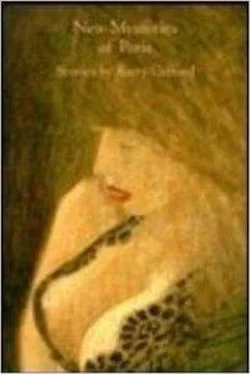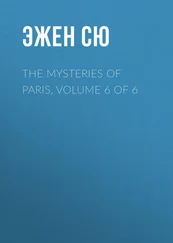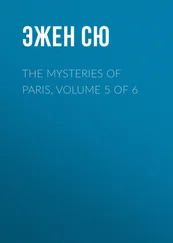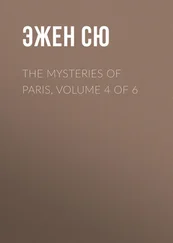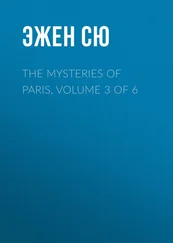Барри Гиффорд - New Mysteries of Paris
Здесь есть возможность читать онлайн «Барри Гиффорд - New Mysteries of Paris» весь текст электронной книги совершенно бесплатно (целиком полную версию без сокращений). В некоторых случаях можно слушать аудио, скачать через торрент в формате fb2 и присутствует краткое содержание. Жанр: Проза, на английском языке. Описание произведения, (предисловие) а так же отзывы посетителей доступны на портале библиотеки ЛибКат.
- Название:New Mysteries of Paris
- Автор:
- Жанр:
- Год:неизвестен
- ISBN:нет данных
- Рейтинг книги:3 / 5. Голосов: 1
-
Избранное:Добавить в избранное
- Отзывы:
-
Ваша оценка:
- 60
- 1
- 2
- 3
- 4
- 5
New Mysteries of Paris: краткое содержание, описание и аннотация
Предлагаем к чтению аннотацию, описание, краткое содержание или предисловие (зависит от того, что написал сам автор книги «New Mysteries of Paris»). Если вы не нашли необходимую информацию о книге — напишите в комментариях, мы постараемся отыскать её.
New Mysteries of Paris — читать онлайн бесплатно полную книгу (весь текст) целиком
Ниже представлен текст книги, разбитый по страницам. Система сохранения места последней прочитанной страницы, позволяет с удобством читать онлайн бесплатно книгу «New Mysteries of Paris», без необходимости каждый раз заново искать на чём Вы остановились. Поставьте закладку, и сможете в любой момент перейти на страницу, на которой закончили чтение.
Интервал:
Закладка:
Barry Gifford
New mysteries of Paris
I was recently told a story that was so stupid, se so melancholy, and so moving: a man comes in into a hotel one day and asks to rent a room. He is shown up to number 35. As he comes down a few minutes later and leaves the key at the desk, he says: ‘Excuse me, I have no memory at all. If you please, each time I come in, I’ll tell you my name: Monsieur Delouit. And each time you’ll tell me the number of my room.’ ‘Very well, Monsieur.’ Soon afterwards, he returns, and as he passes the desk says: ‘Monsieur Delouit.’ ‘Number 35 Monsieur.’ ‘Thank you.’ A minute later, a man extra ordinarily upset, his clothes covered with mud, bleeding, his face almost not a face at all, appears at the desk. ‘Monsieur Delouit.’ ‘What do you mean, Monsieur Delouit? Don’t try to put one over on us! Monsieur Delouit has just gone upstairs!’ ‘I’m sorry, it’s me. I’ve just fallen out of the window. What’s the number of my room please?’
André Breton, Nadja
Nadja was taken to a madhouse in 1928. Some place in the French countryside where ordinary people, those fortunate enough to have escaped scrutiny, who have avoided so far in their lives being similarly judged and sentenced and dismissed from the greater society, will not be reminded of their own failings by the screams of the outcast.
It is reasonable to suppose that by that time there could not be much difference for Nadja between the inside of a sanatorium and the outside — but Nadja was here, she left something of herself. Certainly she’s dead by now, buried in a field behind an insane asylum, cats screwing on her grave.
The day she threatened to jump from the window of her room in the Hotel Sphinx on the boulevard Magenta I should have known she was not a fake. Who can tell the genuine mad from the fake? Nadja could. She was always pointing them out to me. In a café she’d whisper, ‘Look at her. Biting her nails. Pretending to be waiting for someone. She’s a fake. Her lovers disappear.’ ‘But how can you tell,’ I’d ask. ‘Look at my eyes,’ Nadja would say. ‘Can you see the way they are lit from behind? I’m dangerous. To be avoided.’
* * * *
Who was Nadja? What was the significance of Nadja in my life? Why does she return, a constant, though I’ve neither seen nor heard of or from her in fifty years?
I saw a woman in a marketplace in a Mexican city, Merida, perhaps, in the Yucatan, twenty years ago or so. She resembled Nadja, or what she might have looked like, according to my idea of Nadja had she still been alive, let alone an inhabitant of a jungle town in Mexico. I followed her as she moved from stand to stand, inspecting the fruits, dresses, beads, kitchen knives, crucifixes. Was this a woman or a phantom? Her grey hair was worn long and thick and fell across her face so that her features were indistinct, shadowed. Nadja had been blonde, with the short, curled haircut of the day, a brief nose, sharp black hawk’s eyes, a long mouth with slender lips, purple, that grinned in one corner only. This hag in the marketplace was fat, toothless, I would say, judging by the line of her jaw, dark-skinned. Nadja had been white as the full moon of February over Venice, almost emaciated, seldom are, with a full mouth of teeth, crooked but strong. She was capable of cracking open with ease in one swift bite a stalk of Haitian sugarcane.
How could I imagine this hideous, crumbling jungle creature to be Nadja? Some feeling made me follow until, crossing a busy street, I lost sight of her. I panicked and looked around wildly. She was gone and I was forced to suppress a great scream of pain. Unused to this severe sort of anxiety, I battled to control my emotions, there in the midst of a crowd of Indians.
It was what Nadja had meant when she stuck her tongue into my ear as we rode in a cab along the boulevard Raspail. As quickly as she’d done it she withdrew to the opposite corner of the seat and said, staring blankly ahead, ‘To me nothing is more terrifying than the curse of self-fulfilment.’
* * * *
What did Nadja do before we met? I asked her many times and mostly she would avoid answering by laughing and kissing me, adjusting my tie, or brushing my lapels. She did tell me she was born in Belgium, near Ghent, and that her father raised flowers. She went to the local school, a convent, and moved to Paris when she was seventeen. She met a man, unidentified, got married, gave birth to a daughter, who promptly died of pneumonia. Those were facts, according to Nadja. The man was gone soon after the daughter.
Other than that there was little Nadja would admit. None of it was important, she said. ‘Not to you!’ She instructed me to invent her story, it was all the same, unrelated to today. ‘Who is the hero of a film that has at its centre a peacock flying through and landing in the snow?’ Nadja asks, licking my chin as if she were here.
* * * *
I must recall how and why I became involved with Nadja. I was walking along the rue Vaugirard, preparing to turn into the Luxembourg, when I saw a woman standing in front of a butcher’s shop, desperately examining the contents of her purse. I say desperately because there were lines of great consternation on her face, as if she had misplaced and was frantically searching for the ticket that would allow her to claim a side of beef she’d pawned or left to be laundered. The weather was foul, it was early November and it was raining. The air was ugly, full of wood smoke and water, black, brown and grey. The woman, who was Nadja, was a disconcerting sight, her hair matted, stockings torn, coat soaked. I approached her immediately and asked if I might be of service.
’This is an evil afternoon,’ she said. She looked at me. ‘Can you buy me a drink? There are ravens everywhere now. Even in the shops, in the road. The government is full of them, as you no doubt are already aware. What would a government be without its ravens?’ She stared at me with horrible yellow eyes. There was no possibility of refusal. ’Of course,’ I said, and Nadja smiled, a sweet genuine smile, and gently took my arm.
* * * *
Nadja had a harelip. Have I mentioned that? Or had been born with a harelip. She’d had it fixed, but that was the reason for her lopsided grin that added so inexplicably to Nadja’s desirability.
She disliked being thought of as foolish, though she often sought to contribute to the common good by committing foolish acts, such as disrobing in the Louvre in front of the Mona Lisa. For that ’act of valour’, as Nadja referred to it, she spent several days in jail, not having the money to pay the fine for being a public nuisance.
Following the incident at the Louvre, Nadja made a similar gesture of liberation on the avenue d’lena near the German Club. The Germans, she claimed, would not have her arrested; instead, Nadja said, they would pretend to ignore her. Then came the affair at the Trocadéro where Nadja disrobed and poured a bucket of red paint over her head. Neither time was she detained. The Mona Lisa episode had made her famous for the moment and her exploits of this order were no longer effective. Trocadéro was Nadja’s final mention in the newspapers. After that hers was a presence of secrets.
* * * *
Nadja had a habit of laughing at the wrong moment. Someone would be in the midst of telling a story, approaching a crucial point, and Nadja would begin to laugh, softly at first, then gradually increase the level of laughter to a kind of shrill cry, shocking all those present and of course preventing the narrator from finishing his tale. The phenomenon would not occur always, but often enough so that I would be on edge whenever we were in the company of others. Several times I was forced to escort Nadja out of the room until she regained her self-control.
Читать дальшеИнтервал:
Закладка:
Похожие книги на «New Mysteries of Paris»
Представляем Вашему вниманию похожие книги на «New Mysteries of Paris» списком для выбора. Мы отобрали схожую по названию и смыслу литературу в надежде предоставить читателям больше вариантов отыскать новые, интересные, ещё непрочитанные произведения.
Обсуждение, отзывы о книге «New Mysteries of Paris» и просто собственные мнения читателей. Оставьте ваши комментарии, напишите, что Вы думаете о произведении, его смысле или главных героях. Укажите что конкретно понравилось, а что нет, и почему Вы так считаете.
